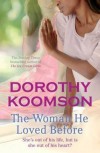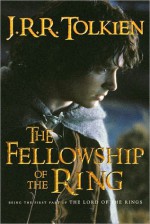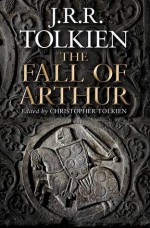A sort-of book blog
This is my own personal record of the things I've read. Half of these will be books for uni (I'm a 2nd year literature undergraduate!)
Currently reading
10 Facts You Didn't Know About J.R.R. Tolkien

Today is Tolkien Reading Day!
This special day has been launched by the Tolkien Society in 2003 and is held annually on 25th March. Tolkien Reading Day's mission is to encourage fans to celebrate and promote the life and works of J.R.R. Tolkien by reading favorite works.
What will you be reading today?
10 Interesting Facts About J.R.R. Tolkien
1. Full name of J.R.R. Tolkien is John Ronald Reuel Tolkien (pron.: Tol-keen; equal stress on both syllables), Ronald to family and friends. His surname is of German origin and meas foolishly brave, or stupidly clever - sometimes he used the pseudonym Oxymore which refer to the name's origin.
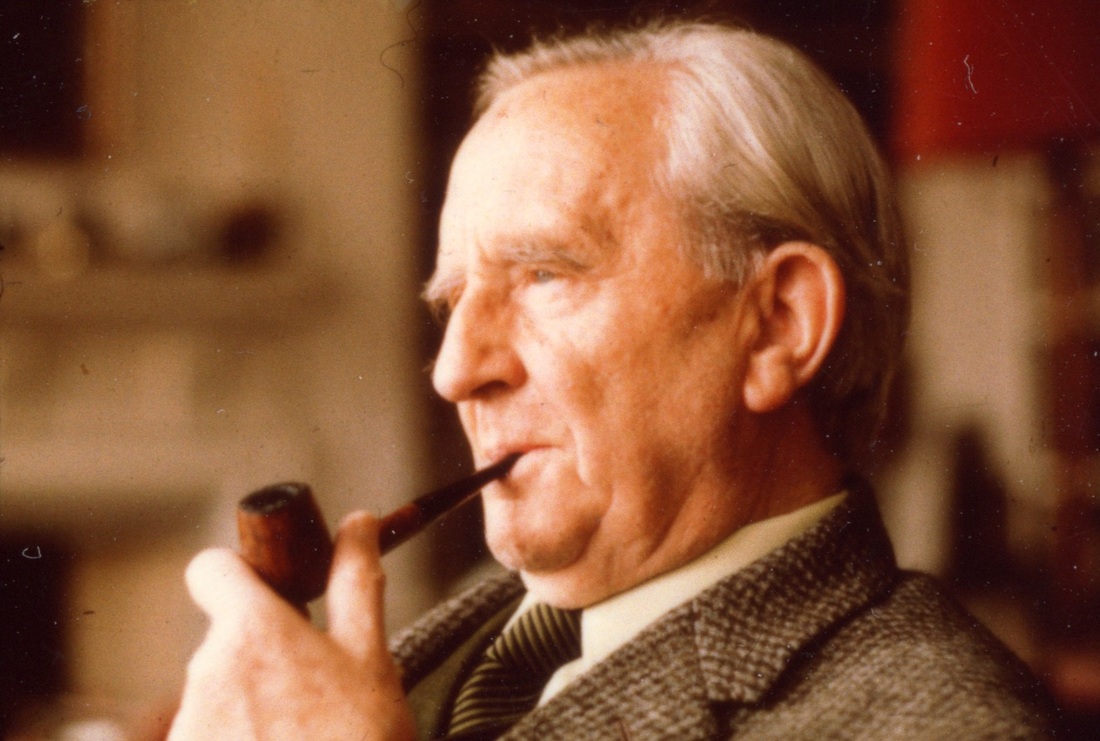
2. Tolkien was born in South Africa where he was kidnapped. When being a toddler in South Africa Tolkien has been "kidnapped" by one of the African servants. The servant thought Tolkien was a cute and a beautiful child and he wanted to show a toddler to his family. Tolkien was returned to his family next day. Tolkien grew up in England where he, his mother and brother moved when he was four.
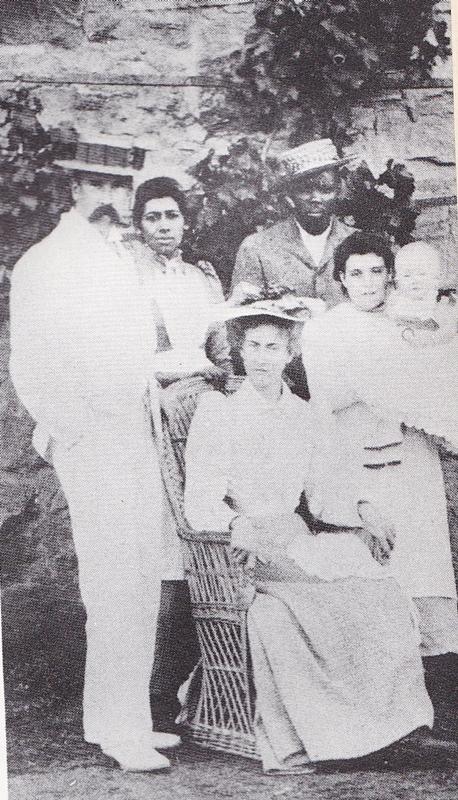
3. One of the vivid memory from South Africa was a huge hairy spider that bit Tolkien when he was a child, this experience could be an inspiration for deadly spiders in his later writing.

Image via Tolkien Gateway
4. Tolkien was talented for languages. He mastered Latin, Greek, Gothic, Welsh, Finnish... It is said he knew over 30 languages and created several of his own.

Image via Tolkien Gateway
5. The character of Gandalf was inspired by "Berggeist" (mountain spirit) created by the German artist Josef Madelener. The postcard with the illustration of an old man in a strange hat was spotted by Tolkien in Switzerland in 1911 during a student trip.

6. In 1920s Tolkien co-founded the Viking Club - the society where he, his professor colleagues and students read old Norse sagas, translate them into Old English and Gothic, entertained and drink beer.

7. Tolkien wrote illustrated letters to his children as if from Santa Clause. This resulted in The Father Christmas Letters published in 1976.


Images via Letters of Note
8. The first sentence of Hobbit was invented by Tolkien while grading student's papers. When he spotted a blank page where and answer to a question should have been provided he wrote "In a hole in the ground there lived a hobbit" as an impulse.


Images via Tolkien Gateway
9. Middle-earth comes from the Old English language middangeard what was an ancient expression for the everyday world between Heaven and Hell.

10. Hobbit was published thanks to a 10 year old boy's review, the publisher's son, who convinced his father that the story was good enough for children aged 5 and 9.
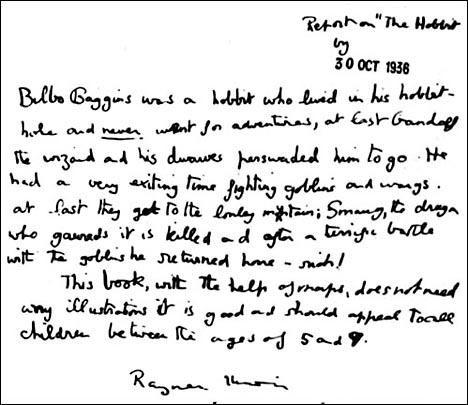
 J.R.R. Tolkien - John Ronald Reuel Tolkien was an English writer, poet, philologist, and university professor, best known as the author of the classic high fantasy works The Hobbit, The Lord of the Rings, and The Silmarillion.
J.R.R. Tolkien - John Ronald Reuel Tolkien was an English writer, poet, philologist, and university professor, best known as the author of the classic high fantasy works The Hobbit, The Lord of the Rings, and The Silmarillion.He served as the Rawlinson and Bosworth Professor of Anglo-Saxon and Fellow of Pembroke College, Oxford, from 1925 to 1945 and Merton Professor of English Language and Literature and Fellow of Merton College, Oxford from 1945 to 1959. He was at one time a close friend of C. S. Lewis—they were both members of the informal literary discussion group known as the Inklings. Tolkien was appointed a Commander of the Order of the British Empire by Queen Elizabeth II on 28 March 1972... more
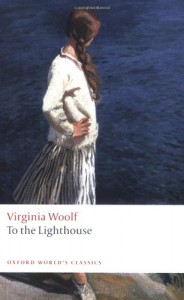
I found To the Lighthouse a little slow and difficult to get into to begin with. As someone who tried to read Mrs Dalloway in lower sixth, and who ended up giving up in frustration, I wasn't especially looking forward to this part of the module. But once you get used to Woolf's prose style, and get into the story, this book is fantastic.
Some of the most striking bits are the saddest. They are not drawn out and lengthy, but short sentences that feel like a punch to the gut. It's hard to articulate any response but 'oh'.
Not an easy read, but worth it.
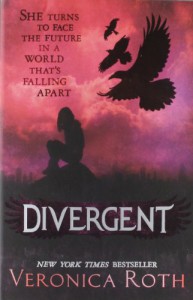
I'm very good at critiquing books by things I've read on tumblr. As a literature student who nearly never has to study anything written after 1950, this especially applies to modern books. So when I jokingly made such a comment about Divergent to my sister (messynotebooks), and found a copy of it lying on my bed with a note saying "Give it a try, won't you?" I felt a little bit guilty. I'm always susceptible to a guilt trip. So I gave it a go.
The first thing I would say about this is at points the narrative voice is weak. Annoyingly weak. There are fantastic concepts that are described in crude and underdeveloped ways, which is really frustrating. The narrative voice in itself is good, but the weak points really limit it.
There's also a lot of really cringey teenage sentiments. I can remember thinking a lot of these myself five years ago, which makes the whole deal a lot worse. It makes it realistic in many respects, but a few of these attitudes promote problematic ways of thinking. Whilst it might be important to acknowledge these in a novel for young adults, it shouldn't be presented as the 'natural' way of thinking without any alternative offered.
All that said, I still gave it 4 stars, which is a pretty high rating for me. Why? It's a bloody good story, when it all comes down to it. I'm going to have to relent and borrow the other ones in the series off my sister when I go home for easter. God dammit girl, as if I don't have enough unread books already.
Now I've finished and reviewed three books today, so I need to go and wallow in my 'what the hell do I do now' sadness. Lottie out.
 1
1
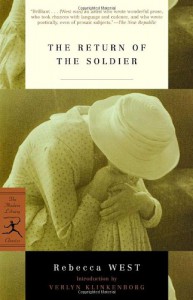
The Return of the Soldier is an interesting read for several reasons, not least because it is a female authored book about the very male topic of the shell shock that often resulted from World War One. It's stylistic, and overly simplistic in places, and yet despite this it is extremely effective in showing the difficulties in coming to terms with the personal effects of the war.
At the beginning of the novella, I had little sympathy for any of the female characters involved. They seemed to be deceitful and dishonest with each other, and their idea of what Chris was before the war seemed far more important to them than the relationships they should have built between each other. The narrative voice at the start seems to give little away, but over the course of the book, grey areas creep in, and the reasonings behind the characters acting in the way they do become clear.
Ultimately, they have to decide between letting the man that they care for so much be happy at their expense, and "curing" him so that he can resume his former duties, both at home and presumably in the war effort.
Good-bye To All That
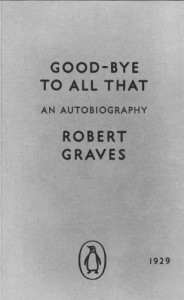
Graves has never been my favourite of the war poets, but his prose is clever and witty, although dry at times. As an autobiographical account of the trenches of the First World War, this book is invaluable. It was published in 1929 in the explosion of war memoirs from combatants, and is fairly typical in this respect.
One thing that never fails to amaze me about autobiographies from writers, is just how small the literary world is. There are references throughout to household names, both that you may expect, and those that you may not; beyond the other war poets of Sassoon, Owen & co. there are also references to relationships with T. S. Eliot, and T. E. Lawrence, among others.
Graves makes a conscious effort not to tie up ends at the end of the book, for which I am very appreciative. It leaves you to think of him not as a character, but as a man, and most of all as a work in progress.
I would recommend this book to anyone who has an interest in the actual experiences of soldiers in the First World War, but would warn them it can take quite some getting into before you can really begin to enjoy the book.
Because I read this book for university, I was made aware of the controversy caused by the publication, with specific reference to Sassoon's reaction. It's worth looking this up in some detail before you read it, if you should choose to, because it highlights some apparent discrepancies in the text.
I still don't know where all the money went...
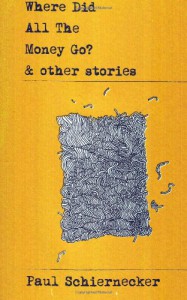
This is a very amusing collection of stories from an extremely talented writer.
I would recommend this to anyone, but especially if you've spent any time at university. You'll find yourself cringing along with characters whilst remembering very similar scenarios... and wondering if the writer could ever look anyone who a gave a copy to in the eye afterwards.
